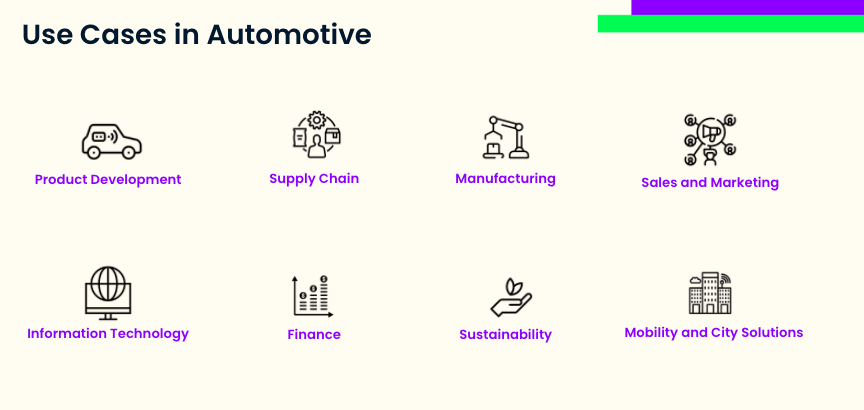

Ford Motor Company’s Model T was first built in 1908 and achieved longevity for its low cost, durability, versatility, and ease of maintenance. It’s credited with “putting the world on wheels,” scaling global mobility through manufacturing efficiencies at a price that the average consumer could afford.
Today, the automotive industry is still on the leading edge of technology and transforming the way the world gets from point A to point B. In our recent webinar, Michael Crabtree, Lead Data Scientist at Ford Motor Company and instructor of our course Credit Risk Modeling in Python, says the key difference is that its innovation is now driven by data science, not manufacturing.
Innovation at Ford is now driven by data science—not manufacturing.
Smart cities require data science in the automotive industry
Similar to how the manufacturing scalability of the Model T brought mobility to the masses over 100 years ago, data science is scaling mobility for lower income communities today. It makes transportation easily accessible without the high cost of ownership and is facilitating this change for everyone, no matter their class, gender, or ability.
For instance, optimization algorithms can provide businesses with energy efficient vehicles to service rural communities for anything from Amazon deliveries to plumbing and food delivery. Data scientists are also working with reliability engineers to produce vehicles that assist differently abled communities.
These are just a couple of examples, but Michael states that there are almost endless use cases for data science, with many yet to be explored.

Working with data in the automotive industry
Because of the automotive industry’s maturity and wide reach, there are many opportunities for companies to rebuild around data.
One application is working with data across different data systems and data types. Many data scientists are accustomed to using tabular data, which means the data is in a table format, similar to Excel. But automotive data scientists have a much greater variety of data to work with. For example, raw instrumentation data in the automotive industry is commonly stored as a stream of hexadecimal digits. They may also encounter data from intelligence systems in the form of images and sensor point clouds. And to understand why an autonomous vehicle behaves a certain way and how that varies among vehicle models, an automotive data scientist might combine point clouds with instrumentation data and join that to a set of tables.
Another opportunity is volume: The largest database Michael has created at Ford contains 80 billion rows, and queries in less than 10 seconds! Some of the real-time and transactional systems within the automotive industry process over 150 million records per day. Because so much automotive data is generated, very large data clusters are needed. Many companies in the automotive industry have data clusters in the petabyte (a million gigabytes) range.
Data science is involved in every step of the automotive product lifecycle
Data science drives product development
There are a lot of steps before a vehicle can be sold to a consumer. Data science in automotive begins with product development. Data science is used for tasks like analyzing new model configurations and modeling component part reliability. Instead of building components and testing at each stage as an isolated system, data science supplements the process through simulation and analysis at scale.
Data science drives excellence in manufacturing
Automotive data scientists also ensure that only high quality vehicles are sold. While engineers are capable of testing the quality of each vehicle, this has to be performed on an individual basis for each vehicle. Data scientists can analyze an entire population of parts, suppliers, and test data. They closely analyze the financial performance of suppliers, predict their ability to deliver on time given past performance, and use econometrics with regressions to check the economic conditions of supplier locations.
Data science drives connected and autonomous vehicles
One of the hottest topics in futurism today is connected and autonomous vehicles, which rely on deep learning models and sensor fusion algorithms. Data science is crucial to building these vehicles: It’s used to translate IoT indicators like oil life monitors, battery charge monitors, and full diagnostics instrumentation into actionable insights. For example, it’s not enough to simply detect a pedestrian—sensors must be able to discern where they’re walking to. Also important are safety systems, including driver protection and environmental safety.
The new connected systems for these vehicles provide new services—they connect with other vehicles, cities, and infrastructure. And we’re just at the beginning stages of exploring the potential of this market. The global connected vehicle market was around \$63 billion in 2019, and that market is set to almost quadruple to \$225 billion by 2027 (Allied Market Research)!
Data science drives sustainability initiatives
Sustainability is very important to all automotive manufacturers. Governments set targets for fuel efficiency, but each auto company has its own goals. And each vehicle has a different fuel efficiency, so data science is necessary to optimize the fuel efficiency of a company’s entire line of vehicles. So if a company wants to offer both a large gas-guzzling pickup truck and an electric car in its product line, automotive data scientists can perform an optimization to minimize the fuel consumption of the entire fleet while adhering to the company’s global sales targets. Optimization efforts can allow auto manufacturers to claim government credits for fuel efficiency. This has a threefold benefit of being good for the environment, providing more value for customers, and opening up a potential source of income.
Other automotive use cases for data science
Beyond what we’ve mentioned, data science impacts so many other stages in the automotive lifecycle. In marketing and sales, data science predicts customer movement and churn. In service and customer analytics, data science improves the customer post-purchase experience and delivers improvements in product quality. To dive deeper into use cases for how data science is driving the future of automotive, watch Michael’s webinar on demand.


